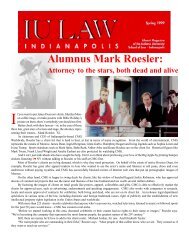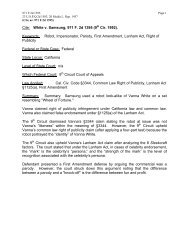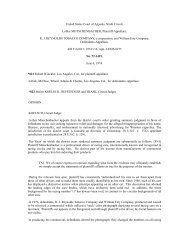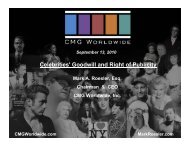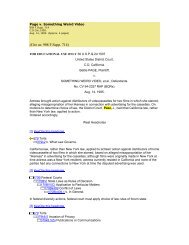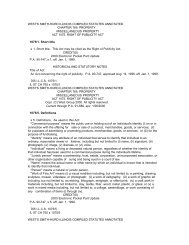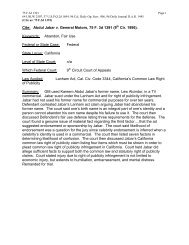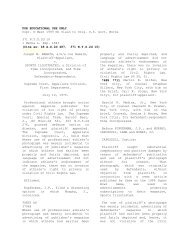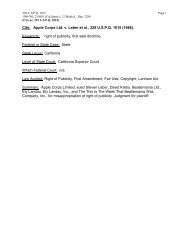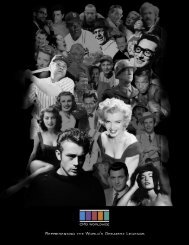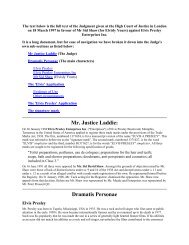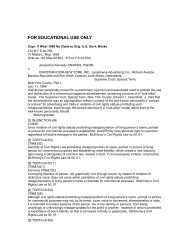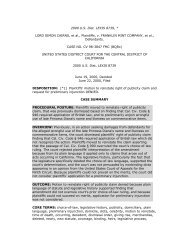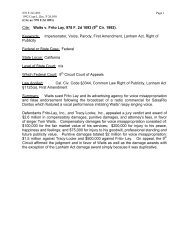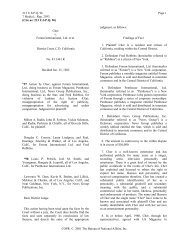Hustler v. Falwell.pdf - Mark Roesler
Hustler v. Falwell.pdf - Mark Roesler
Hustler v. Falwell.pdf - Mark Roesler
Create successful ePaper yourself
Turn your PDF publications into a flip-book with our unique Google optimized e-Paper software.
public figures as well as public officials will be subject to "vehement,<br />
caustic, and sometimes unpleasantly sharp attacks," New York Times, supra, at<br />
270. "The candidate who vaunts his spotless record and sterling integrity<br />
[***11] cannot convincingly cry 'Foul!' when an opponent or an industrious<br />
reporter attempts [*52] to demonstrate the contrary." Monitor Patriot Co. v.<br />
Roy, 401 U. S. 265, 274 (1971).<br />
Of course, this does not mean that any speech about a public figure is<br />
immune<br />
from sanction in the form of damages. Since New York Times Co. v. Sullivan,<br />
supra, we have consistently ruled that a public figure may hold a speaker liable<br />
for the damage to reputation caused by publication of a defamatory falsehood,<br />
but only if the statement was made "with knowledge that it was false or with<br />
reckless disregard of whether it was false or not." Id., at 279-280. False<br />
statements of fact are particularly valueless; they interfere with the<br />
truth-seeking function of the marketplace of ideas, and they cause damage to an<br />
individual's reputation that cannot easily be repaired by counterspeech, however<br />
persuasive or effective. See Gertz, 418 U. S., at 340, 344, n. 9. But even<br />
though falsehoods have little value in and of themselves, they are "nevertheless<br />
inevitable in free debate," id., at 340, and a rule that would impose strict<br />
liability on a publisher for false factual assertions would have an undoubted<br />
"chilling" effect on speech [***12] relating to public figures that does have<br />
constitutional value. "Freedoms of expression require " breathing space.'"<br />
Philadelphia Newspapers, Inc. v. Hepps, 475 U. S. 767, 772 (1986) (quoting<br />
New<br />
York Times, 376 U. S., at 272). This breathing space is provided by a<br />
constitutional rule that allows public figures to recover for libel or<br />
defamation only when they can prove both that the statement was false and that<br />
the statement was made with the requisite level of culpability.<br />
Respondent argues, however, that a different standard should apply in this<br />
case because here the State seeks to prevent not reputational damage, but the<br />
severe emotional distress suffered by the person who is the subject of an<br />
offensive publication. Cf. Zacchini v. Scripps-Howard Broadcasting Co., 433 U.<br />
S. 562 (1977) (ruling that the "actual malice" standard does not apply to the<br />
tort of appropriation of a right of publicity) . In respondent's view, and in<br />
the view of the [*53] Court of Appeals, so long as the utterance was<br />
intended to inflict emotional distress, was outrageous, and did in fact inflict<br />
serious emotional distress, it is of no constitutional import whether the<br />
statement was a fact or an opinion, or whether [***13] it was true or false.<br />
It is the intent to cause injury that is the gravamen of the tort, and the<br />
State's interest in preventing emotional harm simply outweighs whatever interest<br />
a speaker may have in speech of this type.<br />
Generally speaking the law does not regard the intent to inflict emotional<br />
distress as one which should receive much solicitude, and it is quite<br />
understandable that most if not all jurisdictions have chosen to make it civilly<br />
culpable where the conduct in question is sufficiently "outrageous." But in the<br />
world of debate about public affairs, many things done with motives that are<br />
PAGE 7<br />
485 U.S. 46, *53; 108 S. Ct. 876, **880;<br />
1988 U.S. LEXIS 941, ***13; 99 L. Ed. 2d 41<br />
less than admirable are protected by the First Amendment. In Garrison v.<br />
Louisiana, 379 U. S. 64 (1964), we held that even when a speaker or writer is



